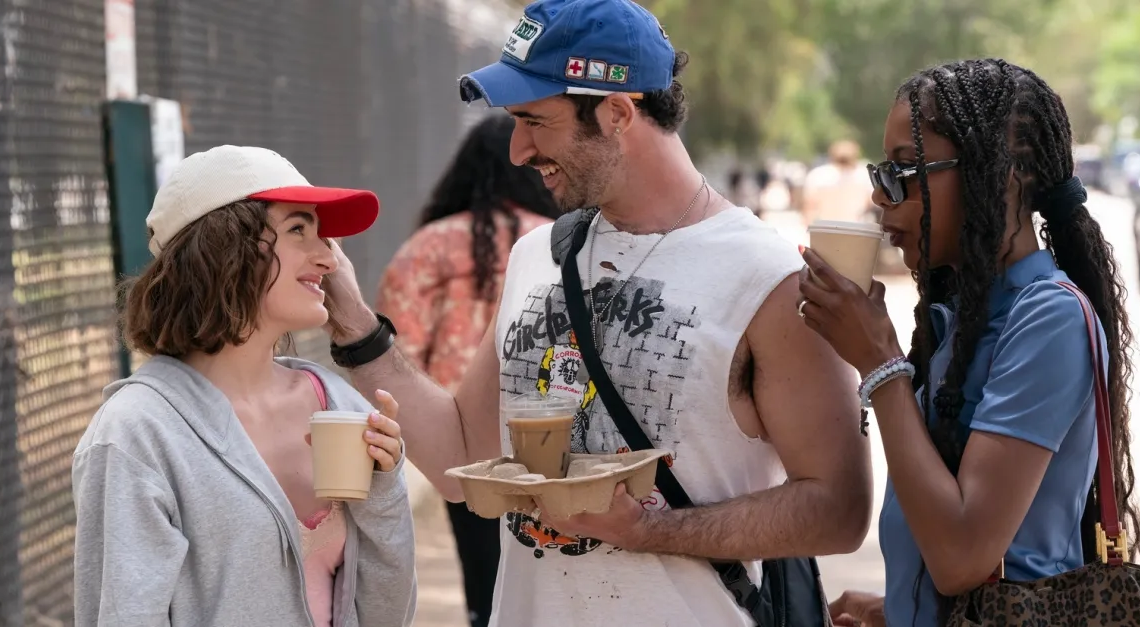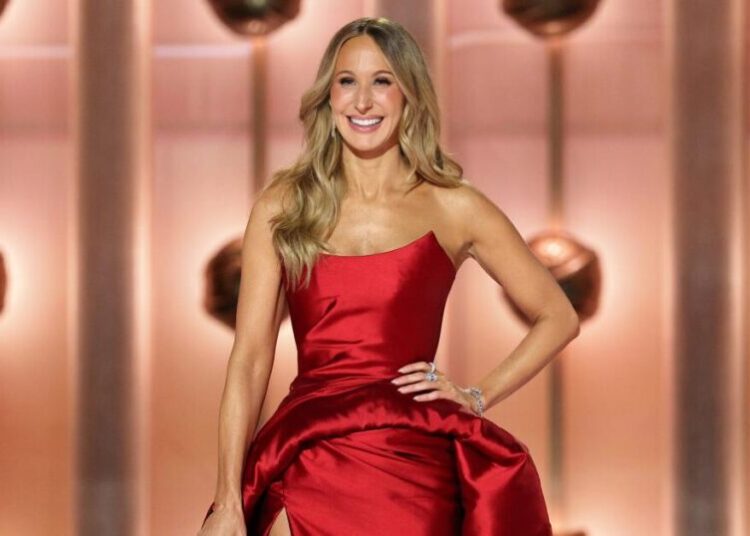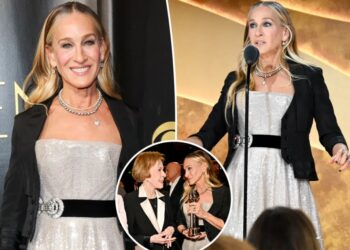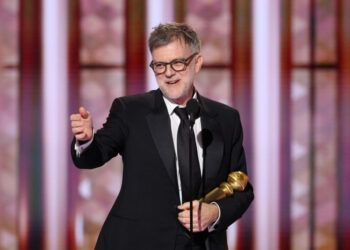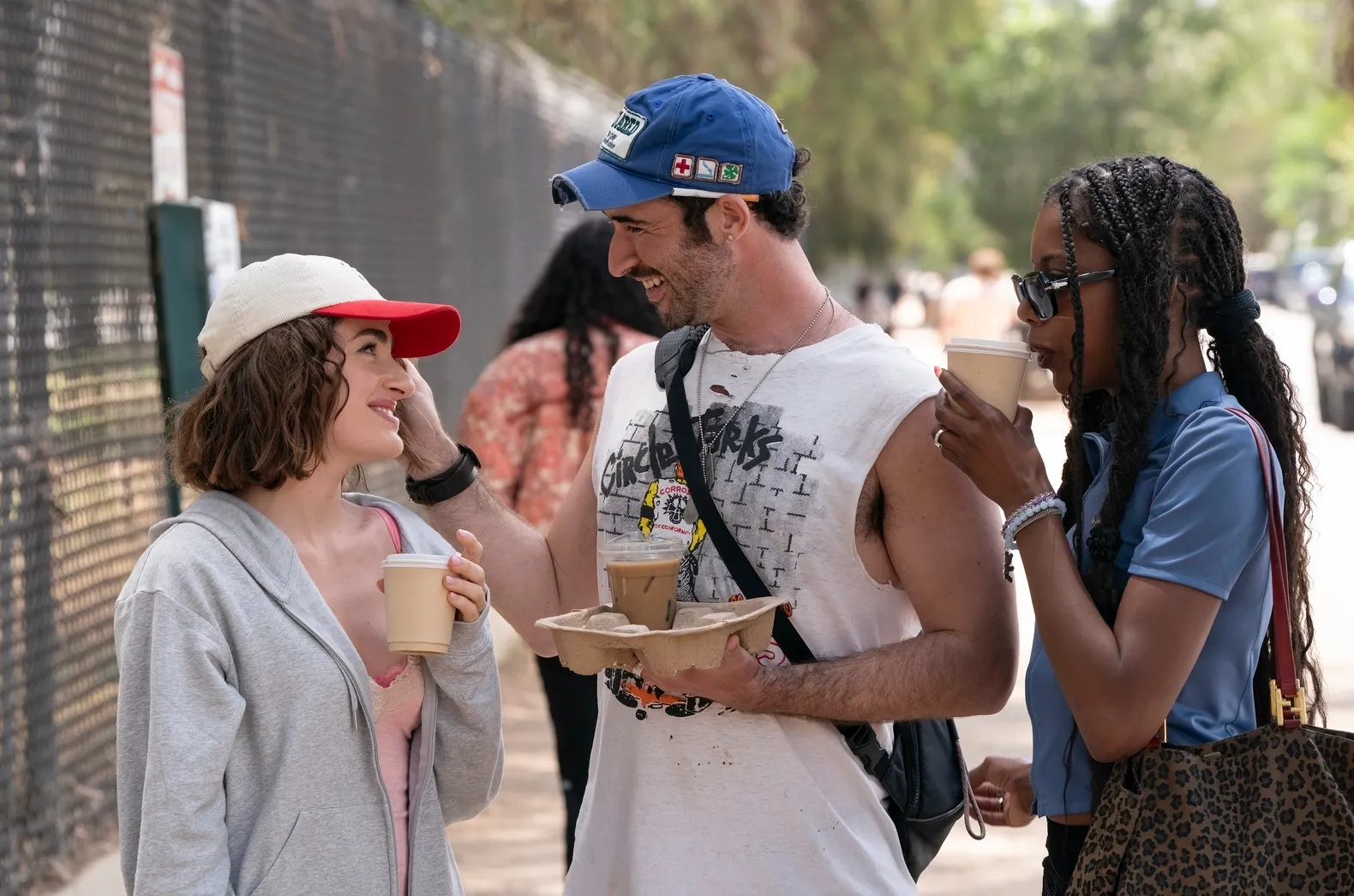
Though it’s still early in its first season, I Love L.A. is already being compared to previous character-driven sitcoms about aimless young people in big cities, namely Girls — only there’s an element of that show that’s noticeably missing from this new one.
I Love L.A. follows aspiring talent manager Maia (Rachel Sennott) and her tight-knit group of friends, including her formerly estranged, influencer bestie Tallulah (Odessa A’zion), whom she represents as a client. Right off the bat, it’s clear the show wants to establish the sort of relatable, “which one are you?” type of TV ensemble. However, their personalities, aside from Maia’s straight-man boyfriend, aren’t all that distinguishable. Maia, in particular, is an oddly nonspecific protagonist whose voice resembles Twitter more than an actual person. Everyone speaks in the same dry, “cool-girl” tone. Maybe this is an accurate depiction of Gen-Z Angelenos nowadays, but it doesn’t really work for a show that’s aiming to make you invested in its characters.
This could very well change as the season progresses. Still, sitting through I Love L.A. brings to mind a larger question: Are we in a TV character drought? Will we ever have someone as iconic and knowable as Carrie Bradshaw or Don Draper on our screens again?
It’s been declared ad nauseam that TV is in its “mid” era, post-Succession. The explosion of streaming has wrought countless shows that are perfectly adequate or plainly bad. It isn’t just the streaming that has made TV protagonists less of a fixture in pop culture, though. If TV characters seem less relevant now, it might be that the confluence of reality TV and social media have allowed ordinary people to replace these imagined figures.
Key Takeaways
- Iconic TV characters take time to cement themselves. But the overcrowded and “mid” landscape of TV right now doesn’t offer much hope that we’ll find another Carrie Bradshaw or Tony Soprano.
- The rise in “casual viewing” programs has limited our investment in stories and the characters who drive them. As writing becomes simplified and seemingly designed for virality, characters become less important.
- Ordinary people — from reality TV stars to influencers to podcasters — are now being treated like “characters,” who consumers can follow and interact with on social media. Why spend a series of episodes trying to uncover the nuances of a protagonist when you can have an intimate, parasocial relationship with a stranger on your phone?
TV is being made differently
To be clear, the sort of TV character that you can easily reference in conversations and dress up as for Halloween isn’t totally obsolete. The Roys from Succession, Carmy from FX’s The Bear and, more recently, Dr. Robbie on HBOMax’s The Pitt, come to mind — although, the latter example is still maybe more of a niche, social-media obsession. ABC’s Abbott Elementary, one of the last remaining network shows that it feels like everyone is watching, has an ensemble with distinct characters who have really seeped into viewers’ households.
Even then, it might be unfair to compare these few contemporary examples to the influence of “Golden Age” antiheroes like Bradshaw, Mad Men’s Don Draper, The Sopranos’ Tony Soprano, Breaking Bad’s Walter White, and the titular Fleabag. According to Vulture critic Kathryn VanArendonk, it took a few seasons for these now-legendary names to “harden into our collective cultural consciousness.” They’ve also managed to claim real estate in our minds due to our current nostalgia-driven culture.
Still, it’s hard to ignore that TV is increasingly being made in a way that allows viewers to be less invested in what’s happening on-screen, let alone be required to pay attention to the quirks and nuances of a particular character — if there are any.
Take the critically panned, Kim Kardashian-starred Hulu show All’s Fair. The characters mostly function to flaunt designer outfits and deliver ridiculously vulgar dialogue that will presumably warrant viral screenshots and clips on TikTok.
It epitomizes a particularly vapid, spare form of TV writing that’s becoming more common, as TV is being referred to and oftentimes feels like a casual, background viewing experience. During the 2023 SAG-AFTRA strike, writer and producer Justine Bateman, who served as AI consultant for the union’s negotiating committee, told the Hollywood Reporter that multiple showrunners had complained about networks telling them their writing wasn’t “second screen enough.” In a Guardian piece from January, Netflix showrunners, who weren’t explicitly instructed to dumb down their writing, discussed the inevitability that the average TV viewer is probably also looking at their phones. This state of affairs hardly inspires vivid character-building.
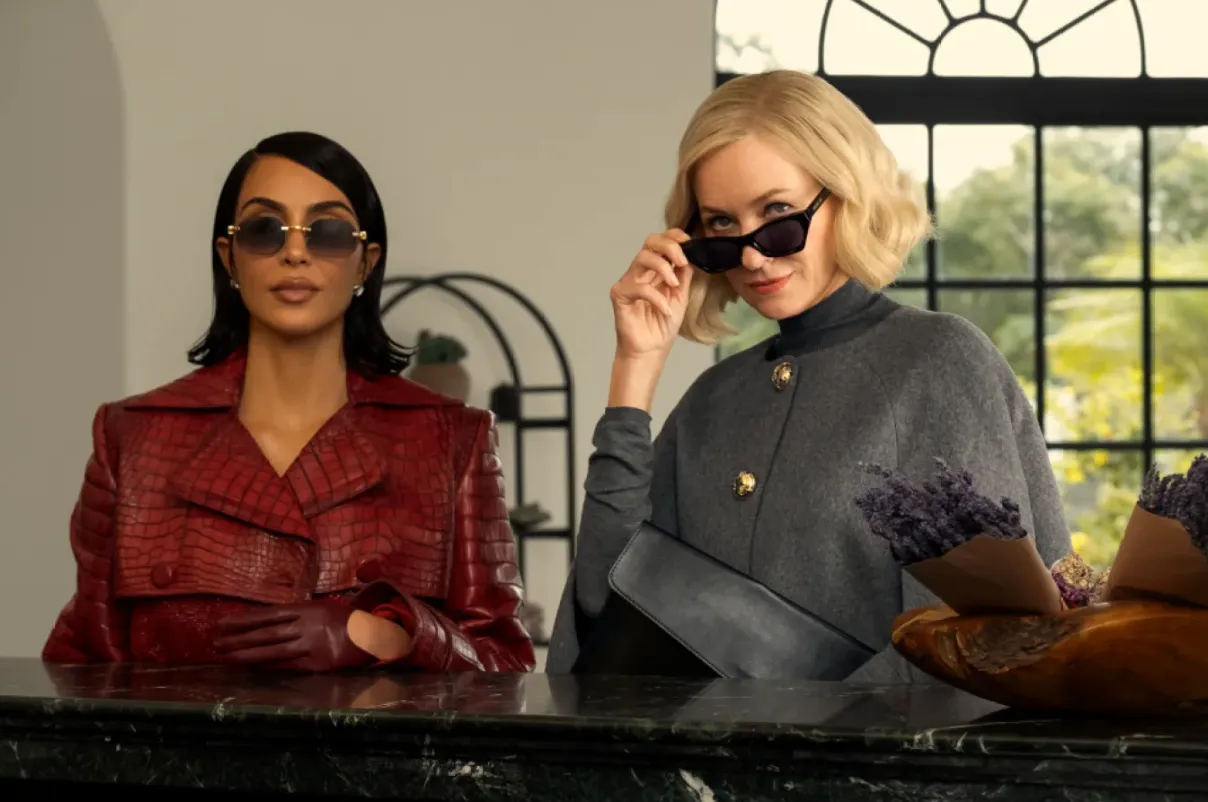 The competition between TV screens and phones has fed into a growing suspicion that some TV writers have instead become hyperfocused on writing quips and shocking dialogue for the sake of being memed and clipped. Many writers have denied this incentive. But it’s hard not to feel this expectation for virality watching something like All’s Fair, where Sarah Paulson calls people “c—burgers” and says things like “greedy little pig bottom.”
The competition between TV screens and phones has fed into a growing suspicion that some TV writers have instead become hyperfocused on writing quips and shocking dialogue for the sake of being memed and clipped. Many writers have denied this incentive. But it’s hard not to feel this expectation for virality watching something like All’s Fair, where Sarah Paulson calls people “c—burgers” and says things like “greedy little pig bottom.”
Even shows with a goal to really engage and stimulate viewers in a more traditional sense are hindered by shorter seasons and inconsistent schedules. In its first season, the HBO teen drama Euphoria established itself as an explicitly character-driven show, with each episode dedicated to the backstory of one of the show’s dysfunctional teens. Since 2019, though, the series has only aired two eight-episode seasons. Apple TV’s Severance is another “appointment TV” series whose storytelling viewers seem especially gripped by. Still, fans have had relatively little of the show to actually consume since it premiered in 2022.
The past few years have also witnessed an increasingly popular approach to TV characters that’s less in-the-moment and propulsive, which VanArendonk sees as a feature of older episodic TV writing. Instead of focusing on plot, the writers are constantly gesturing at characters’ pasts. Many critics have argued that this sort of reverse character development inhibits a lot of initially promising TV shows, notably The Bear, which has been scrutinized in its later seasons for relying too heavily on backstory and flashbacks. VanArendonk argues that characters are more engaging and impressionable when we consume them through their active choices.
“I do want to know things about [a character’s] past,” VanArendonk says. “But just tell me who they are right now and what they are doing today, and what they care about and what their weird quirks are. I promise you that giving me a huge chunk of clues about how they became the person that they are is actually a less important and less effective way of making them feel like a real person.”
Characters are made on the internet now
If there are names in TV that are constantly referenced and familiarized with in our popular consciousness, they seem to come from real life. Reality shows like the Real Housewives franchise, The Kardashians, Love Island, Selling Sunset, and more recently The Secret Lives of Mormon Wives, have been extremely successful in creating household names and recognizable archetypes that stick around for years.
These shows benefit from having longer seasons than many prestige, scripted shows nowadays. But these personalities also remain relevant thanks to years-long tabloid coverage and the stars’ own social-media activity. The past few years have also seen an uptick in spin-off series like The Traitors and Love Island Games that re-cast already familiar reality stars. Even network staples like The Bachelorette, which recently made Mormon Wives star Taylor Frankie Paul its latest titular star, are constantly reinforcing the presence of these personalities in our media consumption now.
“The surge in reality-TV popularity is unmistakable, and it has taken over social media conversation in the way that Mad Men used to,” says Salon’s Coleman Spilde. “People are watching Love Island and Severance the same way. And then there’s just the basic truth that a lot of people would rather spend their time on TikTok than watch narrative television or are only interested in narrative television if an influencer or TikTok star is in it.”
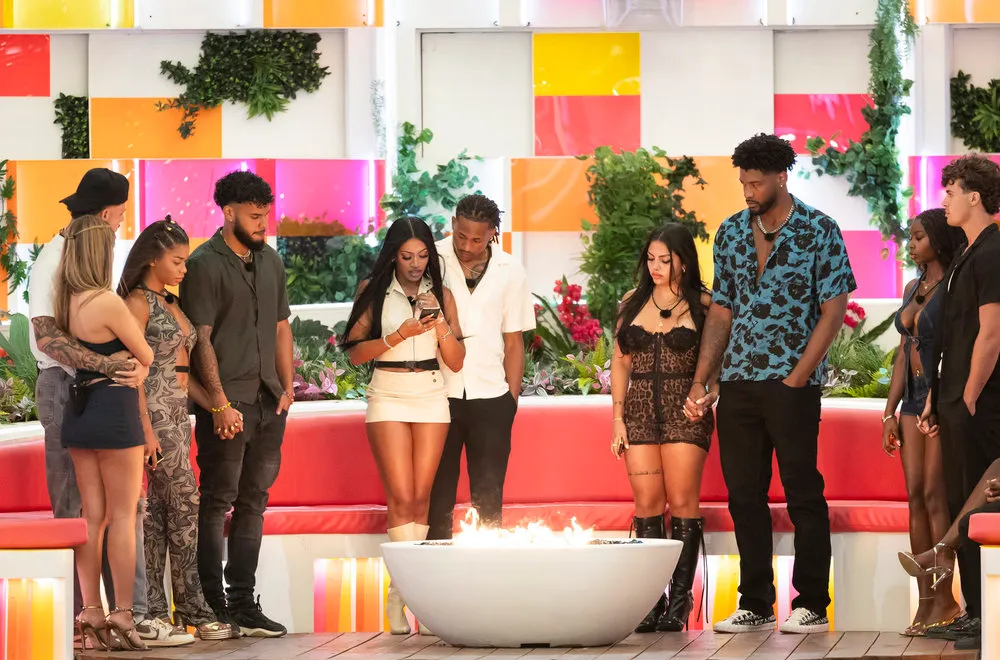 As Spilde suggests, reality TV isn’t the only avenue where the average individual is eclipsing fictional characters in our attention economy. From influencers to podcasters — and influencers with podcasts — to bonafide celebrities caught up in legal scandals, we’re becoming more parasocial in the way we spectate. Social-media personalities, compared to characters confined to fictional settings, are constantly delivering intimate content on a frequent basis. The interactive function of social media also allows us to participate and even alter the storylines and drama we watch unfold online. Real Housewives, for example, has become increasingly centered around online gossip and backlash from viewers.
As Spilde suggests, reality TV isn’t the only avenue where the average individual is eclipsing fictional characters in our attention economy. From influencers to podcasters — and influencers with podcasts — to bonafide celebrities caught up in legal scandals, we’re becoming more parasocial in the way we spectate. Social-media personalities, compared to characters confined to fictional settings, are constantly delivering intimate content on a frequent basis. The interactive function of social media also allows us to participate and even alter the storylines and drama we watch unfold online. Real Housewives, for example, has become increasingly centered around online gossip and backlash from viewers.
Even the average person who doesn’t identify as an influencer has the ability to become the main character of the week or month in our current surveillance culture — the latest example being the Astronomer CEO who was caught cheating with his head of HR on the Jumbotron at a Coldplay concert earlier this year.
This interest in online personalities is bleeding back into television, as more familiar faces from the internet are attempting to revive the medium with varying results. Of course, the comedian/influencer-to-TV-star pipeline isn’t new. But it’s become a reliable formula that doesn’t feel innovative or even fruitful at this point. This year alone has seen Overcompensating starring internet comedian Benito Skinner; Adults, featuring podcaster Owen Thiele; the Meg Stalter comedy Too Much; and the aforementioned I Love L.A. (The most dire example in the category is pretty firmly All’s Fair.) Additionally, it was just announced that the viral internet comedian and Therapuss podcaster Jake Shane is working on a scripted comedy based on his life.
Who knows whether these shows will be capable of producing memorable, era-defining characters further down the line. Right now, though, this trend feels less experimental and more representative of a lack of imagination and general distrust in audiences to become absorbed in the unfamiliar. In the case of a show like I Love L.A., for instance, a familiar face isn’t nearly as exciting as discovering a fresh, enigmatic character week after week.
The post Why are TV’s main characters so forgettable now? appeared first on Vox.
